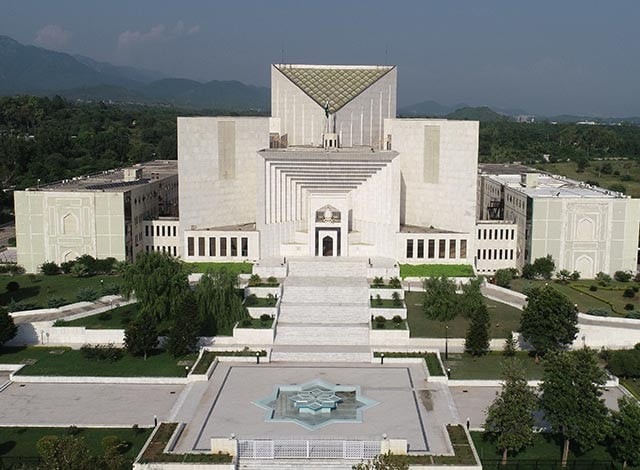SC full court to hear reserved seats case
13-judge bench to hear PTI-SIC plea on June 3

In an unprecedented move, the Supreme Court has constituted a full court to hear the case concerning seats reserved for women and minorities, brought forward by the Sunni Ittehad Council (SIC).
The full court, led by Chief Justice Qazi Faez Isa, comprises Justices Syed Mansoor Ali Shah, Munib Akhtar, Yahya Afridi, Aminuddin Khan, Jamal Khan Mandokhail, Muhammad Ali Mazhar, Ayesha Malik, Athar Minallah, Syed Hasan Azhar Rizvi, Shahid Waheed, Irfan Saadat Khan, and Naeem Akhtar Afghan.
The hearing is scheduled for June 3 (Monday) at 11:30am.
The decision emerged from a committee formed under the Supreme Court Practice and Procedure Act 2023. The committee, chaired by CJP Isa, included Justices Syed Mansoor Ali Shah and Munib Akhtar.
In a meeting held on Thursday, the committee decided by a 2-1 majority to constitute the full court.
On May 6, a three-judge bench comprising Justices Syed Mansoor Ali Shah, Muhammad Ali Mazhar and Athar Minallah suspended a notification from the Election Commission of Pakistan (ECP).
The notification had allocated 77 reserved seats, originally meant for SIC/PTI, to other parliamentary parties in the National and provincial assemblies.
The interim order shocked many, including government officials, and has significant implications for any forthcoming constitutional amendments, including potential changes to the retirement age of superior court judges.
Sources disclosed to The Express Tribune that during the meeting, there was initially talk of excluding judges who might be caught in a conflict of interest if the reserved seats remained with the government, potentially paving the way for constitutional amendments affecting their tenure.
However, the idea was abandoned in favour of forming a full court. Justice Munib Akhtar dissented, preferring a seven-member bench based on seniority, excluding those who might need to recuse themselves.
Justice Akhtar's proposal was to retain the original three-member bench and add four more judges in order of seniority. However, the majority opted for a full court, surprising many, including the petitioners.
This is the second time a full court has been convened during CJP Isa’s tenure. His predecessor, ex-CJP Umar Ata Bandial, had come under fire for not forming a full court in any case, despite calls from the legal community and media.
Meanwhile, the decision to form a full court has sparked debate about the motivations and considerations behind this move. Observers are keenly watching to see how this will impact the handling of the reserved seats case and potential future constitutional amendments.
'Presiding judge holds sway'
Meanwhile, it remains a well-accepted notion within the judiciary that the presiding judge usually holds all the aces in high-profile cases. There's an institutional mindset where other judges tend to give considerable weight to the CJP’s opinion. However, the scenario is quite different in the Islamabad High Court (IHC).
With CJP Qazi Faez Isa slated to steer the full court, his word will carry significant clout in the upcoming case. However, lawyers speculate that CJP Isa might aim for a unanimous decision.
CJP Isa is already under heavy criticism for the January 13 order, where the SC declared PTI's intra-party elections illegal, consequently depriving the party of its election symbol. One major consequence of this order was the denial of reserved seats to the PTI.
Read Naek to represent PPP in reserved seat case
CJP Isa is already catching flak for the January 13 order, where the Supreme Court ruled PTI's intra-party elections illegal, stripping the party of its election symbol. One of the major ramifications of this ruling was PTI being denied reserved seats.
Although CJP Isa has expressed disinterest in extending his tenure, influential executive figures are pushing for a two-year extension. The current administration finds CJP Isa's tenure favourable as he has refrained from questioning executive actions against PTI thus far.
Journalists are having a rough ride this year. They've received notices from the FIA JIT for criticizing the January 13 order, and platform X has been given the axe. Recently, PEMRA put the brakes on TV channels' coverage of court proceedings.
New regulations are in the pipeline to rein in social media, and CJP Isa has voiced concerns about it. It's an open secret that the government is gunning for a 'like-minded CJP' to handle PTI and social media effectively.
On the other hand, the PTI core committee has demanded the disassociation of Justice Isa from the bench, alleging his bias towards the party. Some PTI leaders point to a February 2021 order where then CJP Gulzar Ahmed had suggested that Justice Isa refrain from hearing cases related to Imran Khan.
Interestingly, PTI had not expressed distrust in CJP Isa during his tenure. Following the January 13 order, PTI withdrew a contempt petition against the government for failing to ensure a level playing field during the election campaign.
Faisal Siddiqi, advocate representing SIC in the reserved seats case, has affirmed his unwavering trust in Justice Isa, stating he would never raise objections against him. However, it's rumoured that if PTI/SIC insists on objections, Faisal Siddiqi may withdraw his wakalatnama.
It is anticipated that PTI/SIC will heed Faisal Siddiqi's advice and refrain from objecting to CJP Isa. Faisal Siddiqi has already expressed complete trust in Justice Isa.
The division within the SC has seen a shift after six IHC judges penned a letter about the interference of agencies in judicial affairs. Some judges are now backing the stance of the IHC judges, whereas CJP Isa has yet to lend his support to their viewpoint.



















COMMENTS
Comments are moderated and generally will be posted if they are on-topic and not abusive.
For more information, please see our Comments FAQ